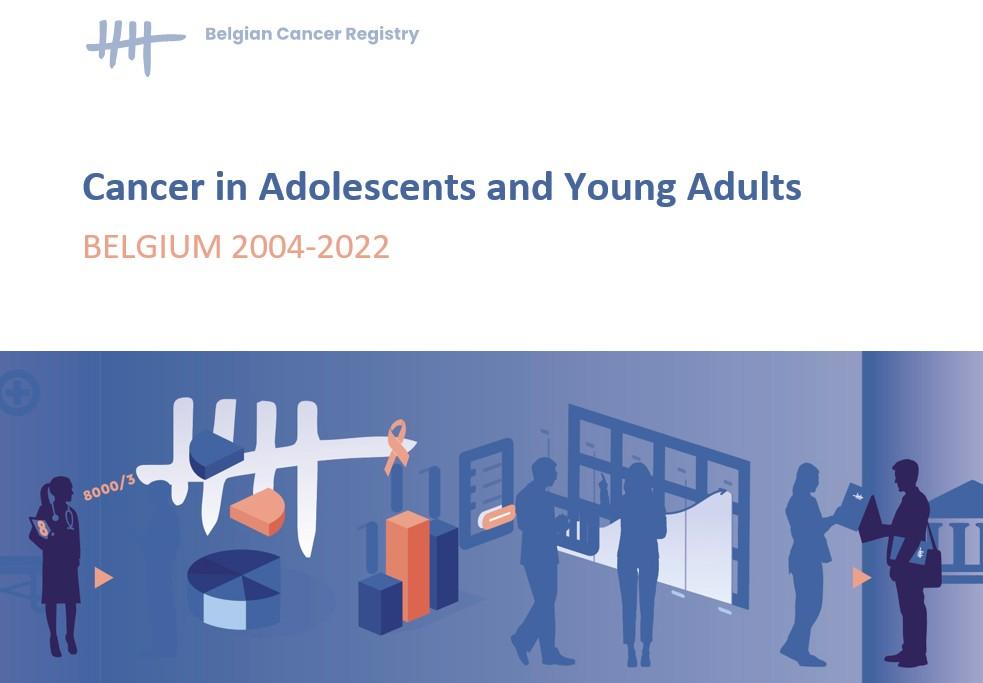
Five young adults diagnosed with cancer each day.
First comprehensive report on cancer in adolescents and young adults in Belgium.
In Belgium, nearly 1800 adolescents and young adults between the ages of 16 and 35 years are diagnosed with cancer every year, amounting to an average of five each day. This is according to a new publication by the Belgian Cancer Registry, which focuses entirely on cancer in this age group, also known as Adolescents and Young Adults or AYAs. The report provides, for the first time, a detailed overview of all cancer diagnoses in AYAs in Belgium.
Cancer in AYAs is relatively rare and comprises less than 2.4% of all new cancer diagnoses in Belgium. This group faces specific challenges and care needs at a stage in life when they are still studying, have just started a family, are growing their career and are building toward their future. Concerns around possible infertility, unemployment, financial pressure, and other uncertainties can therefore particularly impact this age group. These factors have a significant impact on the overall well-being of AYAs, both during and after their treatment.
The most common cancers in AYAs are haematological cancers (cancers of the blood, bone marrow or lymph nodes) followed by breast, melanoma and testicular cancer, which together account for more than 60% of all cancer diagnoses in AYAs (Figure 1). This differs remarkably from cancer in older age groups, where, in addition to breast cancer, prostate and lung cancer are also much more common. It is also noteworthy that cancer in young adults, unlike cancer in children and older adults, is slightly more common in women than in men.
Between 2004 and 2022, the risk of a cancer diagnosis among AYAs increased on average by 0.8% per year. The largest increase was observed between 2004 and 2014, averaging 2.2% per year, after which this risk stabilised. However, there are differences between cancer types. For example, there is an average annual increase in the risk for colon cancer of 2.9% and 0.9% for breast cancer from 2004 to 2022. In contrast, an annual decrease of 2% was observed in the risk of cervical and ovarian cancer.
The good news is that the mortality risk due to cancer among AYAs declined, at an average of 2.4% per year between 2004 and 2021. AYAs generally have a better prognosis after a cancer diagnosis than individuals aged 36 years and older, and this prognosis is still improving. Five-year survival rate (also known as the relative or net survival, where the risk of death due to causes besides the cancer diagnosis are filtered out) increased by 3 percentage points (p.p.) in men, from 85% to 88%, and by 4 p.p. in women, from 87% to 91%, when the incidence period 2005-2010 is compared with the years 2017-2022.
However, prognosis varies widely between cancer types. For instance, AYAs with thyroid cancer have a very good prognosis over the entire 2004-2022 period, the probability of dying within 5 years due to this cancer is less than 1%. In contrast, lung cancer is at the other end of the spectrum with a much lower net survival rate of about 53% after 5 years; fortunately, lung cancer is very rare in this age group.
Even for the 15-year period after diagnosis, the survival results remain promising: a survival rate of 82% for men and 85% for women, if all other causes of death are excluded (Figure 2).
More than half of cancer diagnoses among AYAs in the period 2018-2022 were cervical, breast, testicular or colon cancer and melanoma. The Belgian Cancer Registry encourages young adults to participate in organised screening for cervical cancer from the age of 25 years, but also to be vigilant and consult a physician if they notice possible symptoms, such as a lump in the breasts or testicles, black or blood-coloured stool, or a skin patch with signs of asymmetry, irregular contours, mixing of colours or changes in growth.
The Belgian Cancer Registry dedicates their new publication to all AYA cancer patients, who face their diagnosis and treatment with courage. Their strength and resilience continue to inspire us to keep working towards improvements in cancer care for this unique and often underexposed group.
The full publication is available here: https://kankerregister.org/en/publicaties/cancer-adolescents-and-young-adults-belgium-2004-2022
